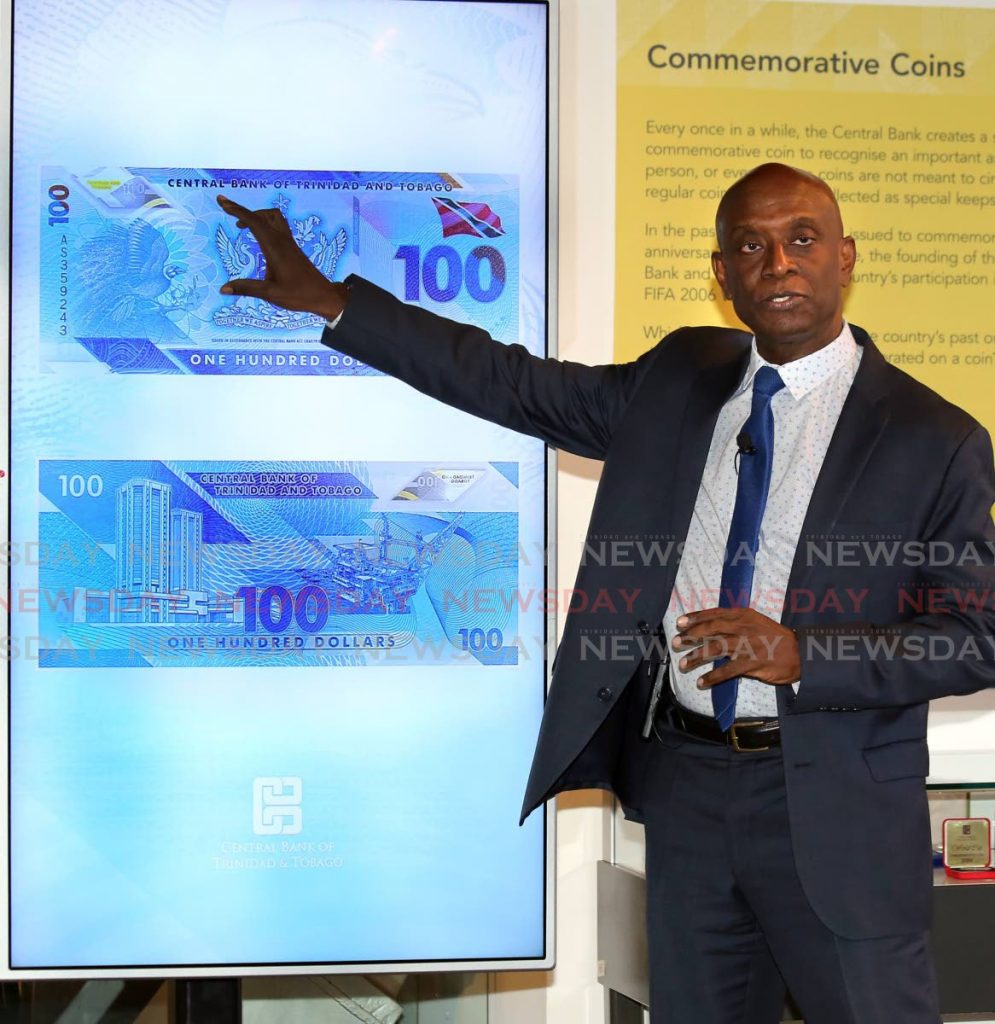[UPDATED] FROM 100 TO ZERO

AS of December 31, old $100 bills will be demonetised and cease to be legal tender.
This means the public has 21 days to either spend or exchange their $100 paper notes.
At a press conference Monday at the Central Bank to sensitise the public on the introduction on the new polymer note, Governor Dr Alvin Hilaire said the cut-off date for use of the old notes would be December 30.
"What we've noticed recently is there has actually been an uptick in forging our hundred dollar notes, and we've found this very disturbing. People are trying to bleach, they're trying to upscale it."
He said, every week the Central Bank receives reports of counterfeit notes and, while there were a few 20s, they were mostly $100 notes. He added, however, that the country's counterfeiting problem was not that large, but the bank had noted a spike in recent months.
On Saturday, the Senate passed new legislation changing the usual three-month time frame for demonetisation to a minimum of 14 days. The new bills were delivered under heavy security to the bank on Saturday, even as the Senate was debating the legislation.
He reported that there was no pre-announcement of the change and no prior consultation, adding that the Bankers Association of TT (BATT) learned of it the day it was announced. He commended financial institutions, and the banks in particular, for the one-day turnaround in getting ready for the new notes. Hilaire said the banks were to receive the new polymer $100 notes on Monday and he asked citizens to give commercial banks some time to get organised.
"Don't rush them. It won't run out."
He said the Central Bank has met with the banks and the ATM suppliers and they understand the challenge and the imperative.
"They are pushing to get things moving as quickly as possible."
BATT, in a media release on Monday, said all banks are working diligently to ensure that ATMs are able to accept the new note within the shortest possible time frame.
On having the change at Christmas, Hilaire said there was "no great time" but the Central Bank was ready and predicted short term disruption.
"It will not be permanent. It will dissipate over time."
He added the country was trying to move towards a more cashless society though this will require legislative and infrastructural changes.
On the timing of the change, he said the Central Bank was approached by the Ministry of National Security about introducing the new bill to address the major problem of money laundering and "we are rising to the call." He said Parliament, bankers and financial entities were all assisting the national security entities in this effort.
Asked whether the ministry's request caused the bank to speed up its process to introduce the notes into the money supply, Hilaire said there had been ongoing conversations and "the two streams just came together." He added that he did not know much about the national security objectives.
He said the initiative could interrupt the amount of funds criminals, such as terrorists, have but he stressed that the new note was a one-off measure and needed to be supported by a battery of other measures for it to work.
Asked the cost of the change, Hilaire said it was not substantial and would cost less because of the shorter time frame.
Another benefit of the new note, he explained, was to assist the visually impaired with the inclusion of Braille and he added that the suite of new notes in polymer will include different Braille features.
He noted the one cent coin was phased out and the metallic composition of other coins have since been changed because it costs much less and saves the country much more.
Safety is an important feature for people to have confidence in their currency, Hilaire said, and polymer can incorporate a whole new blend of features that makes it very difficult to mimic. These features will help to dissuade people from forgery and ensure counterfeit money will not get into the money supply.
From Wednesday to Friday there will be "Know Your Money" sessions for interested people and representatives from De La Rue, the entity that prints and presses TT's currency, will be in attendance.
Hilaire said the changes with the other denominations of banknotes will not be as rushed.
National Security Minister Stuart Young, at a post-Cabinet media conference on Thursday, said the change was to combat money laundering and counterfeiting. On Friday during debate on the Miscellaneous Provisions (Proceeds of Crime and Central Bank) Bill 2019, Young said people who are ill or abroad will be catered for, so as to change their money.


Comments
"[UPDATED] FROM 100 TO ZERO"